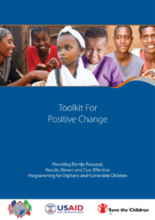The Positive Change: Children, Communities and Care (PC3) Program is a five-year (2004-2009) integrated and comprehensive program designed to provide care and support to more than half a million orphaned and vulnerable children and their families throughout the country of Ethiopia. The Program emphasizes community-based, results-oriented, and family-focused efforts which reduce the negative impact of HIV and AIDS on children, families and communities and increases capacity of local organizations and communities to positively respond to the needs of OVC. The PC3 Program is a consortium of international and local non-governmental organizations (NGOs) and community groups working in partnership to address the needs and unrealized rights of OVC, together with the Government of Ethiopia, private sector and the communities and families themselves.
Funded by the President’s Emergency Plan for AIDS Relief (PEPFAR) through the United States Agency for International Development, Save the Children USA is the lead agency and works in close collaboration with four international NGO partners including CARE, Family Health International, World Learning and World Vision. In addition, key PC3 partners include 35 national NGOs and 575 community-based organizations who together deliver coordinated and comprehensive care and support services to 530,000 orphaned and vulnerable children and their families in seven regions of Ethiopia.
The level of support generated at scale in Ethiopia provides an important guide for similar responses in Africa and globally. Key to achieving this level of support at scale, and discussed in detail in this Toolkit, are the following strategies:
Design for Scale ~ Harnessing Partner Strengths: The PC3 Program used the design process to join partner strengths and capacities and build an approach that would be sustainable at scale from the initiation of the program. Building a network of concerned individuals, caregivers, and group institutions who would be able to provide support and care was carefully considered. Together with key collaborating partners program principles, values and code of conduct were jointly established to assure protection of children and quality services.
Multi-Level Tiered Approach: The institutional and technical capacity of existing grassroots, community-based organizations and local NGOs was built to provide sustainable, long-term safety nets and services to OVC and their families.
Building on Existing Community Coping Mechanisms and Groups: Ethiopia is home to a proud culture, rich in traditions, age-old customs, and strong relationships among family, kin and community members. PC 3 has built on positive Ethiopian traditions and culture which care for vulnerable children that have unified individuals, community groups, local government structures, and national organizations to rise to the challenge and come together to support a united vision and a brighter future for OVC in Ethiopia.
Empowering Community Mobilization: The Community Action Cycle (CAC) was applied by communities themselves to organize, assess, plan and act collaboratively to increase and improve care and support to orphans and vulnerable children. The process built community ownership and sustainability from the start and supported communities to reach their identified goals for vulnerable children.
Capacity Building at Multiple Levels: Capacity-building of partners assures standardization of training and effective roll out of comprehensive, family focused coordinated care services to children and households impacted by HIV and AIDS. Partners at all levels build critical organizational and service delivery skills.
Quality services defined by Children and Their Caregivers: Involvement and active participation in decisions which affect their own lives have lead to integrated support including access to education, food and medical care, psychosocial counseling, legal advice and protection, life skills training, micro-credit for income-generating activities, and safer homes.
This Toolkit shares the key strategies and tools which were used by concerned and committed Ethiopians to address the needs of vulnerable children in their communities. It is the hope of all who have been involved in The Positive Change: Children, Communities and Care (PC3) Program that the Ethiopian experience will be utilized and applied wherever OVC need support, services and care. The tools presented herein are tested, family-based, cost-effective and child-centered.

